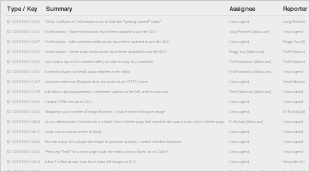Time/Place
This meeting is a hybrid teleconference and IRC chat. Anyone is welcome to join...here's the info:
- Time: 11:00am Eastern Daylight Time US (UTC-4)
- Dial-in Number: (712) 775-7035
- IRC:
Attendees
Agenda
Update from "Alignment to Spec" sprint
- Documentation updates go to: Fedora 5.x Documentation
- Oxford Common Filesystem Layout
- Wrapping up fcrepo-import-export-verify: https://github.com/fcrepo4-labs/fcrepo-import-export-verify/pull/48
Tickets In-Review
- ..
Ticket Summaries
Please squash a bug!
Tickets resolved this week:
Tickets created this week:
Minutes
Actions
- API Alignment Sprint
- The first sprint moved alot of CRUD and fixity alignment issues, did lots of planning on versioning and authz.
- The second sprint carrying on and trying to move the versioning into a final design that will work and handling loose ends around Authz.
- Meeting at 12:00 ET today to talk about the actual planning for versioning.
- Important information from Sprint 1 - Ensure the versioning design implementation as no overlap between versioning sprint team members from 1 to 2
- Meeting Tuesday Sept. 26 with some Sprinters and Memento folks to:
- Checked the design document.
- Checked the delta document.
- Checked the JIRA tickets created around versioning.
- Asked questions of the Memento folks around where there were some confusion.
- Bethany Seeger - Memento folks thought the best plan for action was that the LDPRv LDPCv and all LDPRm(s) could have seperate ACLs.
- LDPRm(s) would all share a single ACL, not per Memento.
- Another call with the Memento team on next Tuesday so having questions fleshed out before that call would be beneficial.
- WebAC codebase has been merged into the core codebase, now working on hooking it up and looking at ways to enable/disable AuthZ at deploy time.
- Consider moving the old WebAC repository out of the fcrepo4 organization, but annotationing the README that it is still the major AuthZ for 4.7.
- SOLID Spec for aclAgentGroup being a list of vcard members, where agentClass is for public. Note at the end of this section (https://github.com/solid/web-access-control-spec#public-access-all-agents) was confusing.
- Should we remove agentClass or are we just adding agentGroup for lists (which we previously used agentClass).
- Andrew Woods believes to limit use of agentClass to foaf:Agent for now. acl:agentClass should only be used with foaf:Agent to ascribe public access. Esmé Cowles and Daniel Lamb agrees.
- 5.x documentation space has been created to capture the changes.
- Oxford Common Filesystem Layout
- There have been discussion around preservation sensibilities with respect to Fedora.
- With the API specification and defining user level interactions and allows an abstract layer to separate client from Fedora.
- The sentiment of the OCFL is the same in how information is persisted on the filesystem. What is persisted and what information and what format.
- In the Modeshape we would not force Modeshape to use this, but could bundle functionality to also synchronously or asynchronously persist to the filesystem using the OCFL initiative.
- Could be useful for interoperability scenarios (ie. import/export, BagIt creation, Camel serialization service) where the point is to have something persisted and using a filesystem abstraction layer.
- A little uncomfortable if a repository would be expected to make accessible it persisted storage on the filesystem in this format.
- When talking about a backup you need a static system and most times the information persisted to the filesystem is not sufficient to perform a restore. You would need to include additional information.
- From a preservation perspective (and Modeshape) the binaries are relatively safe, we lose the filename (is replaced by the SHA-1). The metadata is in the database. The nature of the database in which the data is stored could be considered fragile. From a longer term preservation stand-point and recognizing the application (Fedora) as the steward of the content now, but it leaves open the possibility of making transition to future stewards.
- perhaps the journaling used in Fedora 3 could be a consideration.
- Fedora becomes the files and everything else (the software) is fungable. The OCFL becomes the Fedora API.
- Fedora had beauty with the persistence on disk, but performance issues in reading the data off files at every turn.
- Users can see the data and that data can be moved around.
- Camel serialization toolkit and import/export → so you are not messing with live data.
- It would be possibly to store everything as files on disk, binaries as themselves and RDF sources as also files. Possible but not necessarily part of the specification. Each institution had a different use case.
- Is there enough interest and value seen to people in the community for the OCFL as a specification or best practice guidelines?
- Broadly how do you persist links between resources once they are on the filesystem.
- Import/Export made their own layout, which is different from BagIt (for example). So this could be useful for standardization around this type of output.
